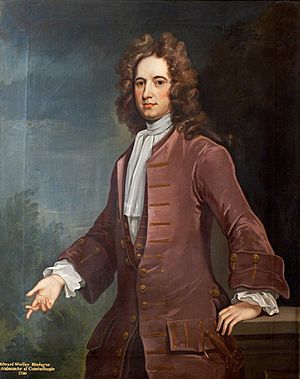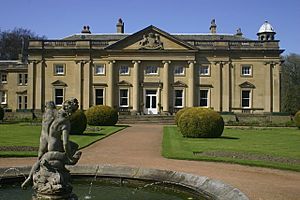Edward Wortley Montagu (diplomat) facts for kids
Quick facts for kids
Edward Wortley Montagu
|
|
|---|---|

Portrait of Edward Wortley Montagu from 1730
|
|
| Born | 1678 |
| Died | 1761 |
| Occupation | politician diplomat |
| Spouse(s) | Lady Mary Wortley Montagu |
| Children | Mary Stuart, Countess of Bute, Edward Wortley Montagu |
| Parent(s) |
|
Edward Wortley Montagu (born 1678, died 1761) was an important English politician and coal-owner. He served as a British Ambassador to the Ottoman Empire. He was married to the famous writer Lady Mary Wortley Montagu. His daughter, Mary, later became the Countess of Bute.
Contents
Edward Wortley Montagu's Life Story
His Early Life and Education
Edward Wortley Montagu was born in 1678. His father was Sidney Wortley Montagu, and his grandfather was Edward Montagu, 1st Earl of Sandwich. Edward went to Westminster School, which is a well-known school in London. After that, he studied at Trinity College, Cambridge in 1693. He also studied law, becoming a lawyer in 1699.
Traveling Europe
Around 1700 and 1701, Edward went on a "Grand Tour." This was a long trip around Europe that young, wealthy men often took to learn about other cultures. He visited countries like France and Switzerland. For some of this trip, he was with his friend Joseph Addison, who was also a famous writer.
Becoming a Politician
Edward Wortley Montagu was a member of the Whig Party, which was a major political group in Britain at the time. He was first chosen as a Member of Parliament (MP) for Huntingdon in 1705. An MP is someone elected to represent people in the country's government.
Working for the Government
From 1714 to 1715, Edward served as a Lord Commissioner of the Treasury. This meant he helped manage the country's money and finances. In 1715, he was elected as an MP again, this time for Westminster.
Ambassador to the Ottoman Empire
In 1716, King George I chose Edward to be the British Ambassador to the Ottoman Empire. This was a very important job, as an ambassador represents their country in another land. Edward and his wife arrived in a city called Adrianople (now Edirne) in 1717.
His Role in Turkey
Edward's main job was to help with talks between the Ottomans and the Habsburg Empire. Even though he worked hard, he was not officially recognized as the Ambassador in Constantinople (now Istanbul) before he was called back home in 1717. He left Turkey in 1718 and traveled more in the East before returning to England.
A Man of Business
After returning to England, Edward continued his work as an MP. He represented Huntingdon again from 1722 to 1734. He also had a big interest in the coal industry.
The Coal Industry
Since about 1709, Edward was involved in the coal business. In 1726, he and his father helped create a group called the Grand Allies. This group was a partnership of coal-owners in North East England who worked together to manage the coal trade. When his father passed away in 1727, Edward inherited Wortley Hall, a large family estate near Barnsley in South Yorkshire. He continued to serve as an MP for Peterborough from 1734 until his death in 1761.
Wortley Hall: A Grand Home
Wortley Hall was the family home that Edward inherited. He made many changes and improvements to the house. In 1743, a new design for the south side of the hall was built by Giacomo Leoni. Later, from 1757 to 1761, the East Wing was added. This work was done by John Platt. Some experts believe the design for these additions might have been by Matthew Brettingham. Work on the hall continued even after Edward's death, with the West Wing being added for his daughter Mary in the 1780s.
His Family Life
Edward Wortley Montagu married Lady Mary Wortley Montagu in 1712. They had two children: a daughter named Mary and a son also named Edward. When Edward passed away, he left Wortley Hall and most of his large fortune to his daughter Mary. Mary later married John Stuart, 3rd Earl of Bute, who became a future Prime Minister.
 | Georgia Louise Harris Brown |
 | Julian Abele |
 | Norma Merrick Sklarek |
 | William Sidney Pittman |


